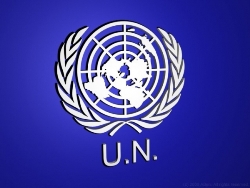ANALYSIS: US decision to join rights council welcomed by UN
 Geneva - The US administration' announcement that it will seek a seat on the Human Rights Council has been greeted warmly by United Nations officials, who see it much in the light the US has been hoping: A step in the direction towards global engagement.
Geneva - The US administration' announcement that it will seek a seat on the Human Rights Council has been greeted warmly by United Nations officials, who see it much in the light the US has been hoping: A step in the direction towards global engagement.
"I warmly welcome the engagement of UN member States to contribute to the important work which lies ahead of us," said Martin Ihoeghian Uhomoibhi, the president of the council in Geneva.
He said the US decision to run for the seat was "further evidence of their commitment to advancing human rights globally."
"The Human Rights Council has a critical role to play in the protection and promotion of all human rights for all people, and the US has an important contribution to make to this end," UN Secretary General Ban Ki-moon said in a statement.
It was an "embodiment of the US commitment to a 'new era of engagement.'"
The council was derided by former president George W Bush as overly politicized and ineffective, and the administration refused to run for a seat in the rights body.
One of the primary criticism leveled against the council by some Western states and organizations working to promote Israel was its "obsession" with the Jewish State and what they called a disproportionate focus that has been placed on the Palestinian issue.
Some went further, saying it was distracting the council's attention from other situations.
The Israeli ambassador to the UN, however, called the US decision a "timely one."
"The council badly needs the US as a member," Aharon Leshno-Yaar told the German Press Agency dpa.
"I think its membership will be a huge contribution to the work of the council," he added.
The US has pledged to "stand up against groundless criticisms and politicized attacks."
The announcement was also welcomed by Germany, which is currently a council member but will be finishing its term in May, when the elections by the UN General Assembly were scheduled.
New Zealand went as far as to say it would remove itself from the running for the seat on the council, effectively clearing the way for the US.
"We did not ask anyone to withdraw," said Richard Wilbur, a spokesman for the US mission to the UN in Geneva. "But we did talk with countries as we were considering the decision."
With New Zealand's withdrawal, only Norway and Belgium, and now the US, remained in the running for the three seats opening up in the regional group, meaning, Washington's place was guaranteed, barring any last minute surprises.
Wilbur said that President Barack Obama "has embarked upon an 'era of engagement,' but this is not engagement for engagement's sake," noting that the US did hope to effect change in the council.
"We are committed to doing all we can to move the Council in a positive direction," he said.
US officials noted that Washington alone could not influence such an organ as the council but would require cooperation from other members, something that it would look to achieve.
The US began its "re-engagement" with the council last month, when it started to participate as an observer in human rights sessions, issuing statements on various issues from the Middle East to North Korea.
A key question remaining in Geneva was whether the US would choose to join the Durban review conference on racism. Washington has been sitting on the fence, waiting to see the final text and whether it would single out Israel or talk of reparations for the trans-Atlantic slave trade.
There would be some eyebrows raised if the US did not attend the conference at the end of the month, but then asked to be elected to the council the following month.
However, there were hopeful voices within the UN, some of them the same voices that were counting on the new administration joining the council, that the US would be present at the Durban review. (dpa)